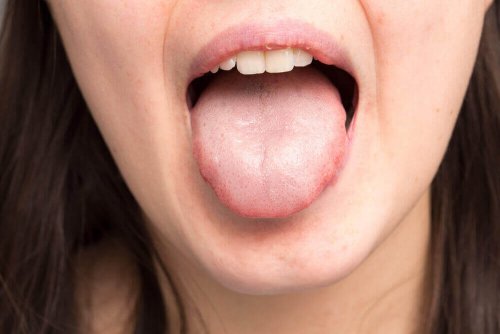Thick Saliva: Why Does It Happen?

Saliva is essential for the oral cavity to function properly, as it keeps all of its tissues moist and helps clean the mouth. So, if you notice you have thick saliva, this is probably due to an imbalance.
First, it’s important to know that the salivary glands produce saliva. There are various morphological changes in saliva when these glands alter – perhaps due to chemotherapy and radiation, among other reasons. Thus, the saliva becomes sticky and viscous, and therefore thicker.
Apart from the common inconveniences, this can also lead to problems with speech, swallowing, and even breathing. That said, how can you address this problem?
The causes of thick saliva
Thick saliva can be due to various conditions, such as:
- Arterial hypertension
- Diabetes
- Renal problems
- Salivary duct stones or other obstructions
- Cancer
- Parkinson’s disease
- HIV
- Mouth infections
- Strokes
It can also be due to dry mouth or irritation due to hormonal changes, especially in women over the age of 40. As you can see, aging is a cause all on its own.
Another very common cause is the side effects resulting from chemotherapies, antihistamines, antidepressants, diuretics or analgesics.

What problems can it cause?
When saliva is too thick, it affects the way you swallow. Then, you end up sucking in instead of swallowing due to the reduced lubrication in the oral cavity. Over time, this might result in pulmonary aspiration.
Also, the dry and viscous mouthfeel leads to bad breath, and difficulty swallowing, chewing and talking. Also, there’s an increase in cavities and gum disease. Plus, the tongue becomes dry. This doesn’t only change your sense of taste but also creates fissures in it. Mouth sores and chapped lips are very common, too.
Read also: Learn All about Swallowing Disorders
Diagnosis
There’s a way to evaluate salivary flow, called Sialometry. It specifically evaluates the amount of saliva. Doctors can also do a biopsy of the salivary glands to analyze it and find out if there are any pathological problems.
Treatment
There’s no treatment for damaged salivary glands are damaged. However, there are some tips for thinning thick saliva:
- Increase the amount of water your drink to thin your saliva.
- Moisten your meals with sauces, broths, etc.
- Use a room humidifier.
- Sleep with your head in an elevated position.
- Do gargles.
- Brush your teeth frequently.
- Chew gum often.
- Limit your use of alcohol and tobacco.
- Decrease your intake of spicy foods.
Dental treatments for thick saliva
Also, it’s important to bear in mind any pre-existing illnesses or drugs that a person is taking, together with any psychological factors there may be. In some cases, a doctor might recommend salivary production stimulants or salivary substitutes such as Xylitol, aloe vera, or fluoride.

Proper oral hygiene is a must to mitigate the effects of thick saliva. In addition, it helps you reduce bad breath, which is commony caused by this problem.
Xylitol remineralizes, prevents tooth decay, and it’s also a lubricator. Aloe vera helps heal and thus prevents sores and fissures, both on the tongue and lips. As you can see, these substances can improve your symptoms.
Finally, oral hygiene is essential. So, make it a habit to clean your mouth thoroughly with a brush and toothpaste. You may also want to use mouthwashes and lubricating gels, as they’re very helpful for patients with this problem.
All cited sources were thoroughly reviewed by our team to ensure their quality, reliability, currency, and validity. The bibliography of this article was considered reliable and of academic or scientific accuracy.
- Falcão, D. P., da Mota, L. M. H., Pires, A. L., & Bezerra, A. C. B. (2013). Sialometry: Aspects of clinical interest. Revista Brasileira de Reumatologia. Elsevier Editora Ltda. https://doi.org/10.1016/j.rbr.2013.03.001.
- Nayak PA, Nayak UA, Khandelwal V. The effect of xylitol on dental caries and oral flora. Clin Cosmet Investig Dent. 2014;6:89–94. Published 2014 Nov 10. doi:10.2147/CCIDE.S55761.
- Rudney, J. D. (2000). Saliva and dental plaque. Advances in Dental Research. https://doi.org/10.1177/08959374000140010401.
- Ligtenberg, A., Liem, E., Brand, H., & Veerman, E. (2016). The Effect of Exercise on Salivary Viscosity. Diagnostics, 6(4), 40. https://doi.org/10.3390/diagnostics6040040.
- Petrušić, N., Posavec, M., Sabol, I., & Mravak Stipetić, M. (2015). The Effect of Tobacco Smoking on Salivation. Acta Stomatologica Croatica, 49(4), 309–315. https://doi.org/10.15644/asc49/4/6.
- Rebolledo C, et al. Sialolitos en conductos y glándulas salivales. Revisión de literatura. Avances en Odontoestomatología 2009;25(6):311-317. Disponible en: https://scielo.isciii.es/pdf/odonto/v25n6/original1.pdf.
- Cersosimo MG, Raina GB, Calandra CR, Pellene A, Gutiérrez C, Micheli FE, Benarroch EE. Dry mouth: an overlooked autonomic symptom of Parkinson’s disease. J Parkinsons Dis. 2011;1(2):169-73. doi: 10.3233/JPD-2011-11021. PMID: 23939300.
- Schiødt M, Dodd CL, Greenspan D, Daniels TE, Chernoff D, Hollander H, Wara D, Greenspan JS. Natural history of HIV-associated salivary gland disease. Oral Surg Oral Med Oral Pathol. 1992 Sep;74(3):326-31. doi: 10.1016/0030-4220(92)90069-3. PMID: 1407995.
- Maciejczyk M, Gerreth P, Zalewska A, Hojan K, Gerreth K. Salivary Gland Dysfunction in Stroke Patients Is Associated with Increased Protein Glycoxidation and Nitrosative Stress. Oxid Med Cell Longev. 2020 Dec 10;2020:6619439. doi: 10.1155/2020/6619439. PMID: 33488927; PMCID: PMC7787773.
- Manley KJ. Saliva composition and upper gastrointestinal symptoms in chronic kidney disease. J Ren Care. 2014 Sep;40(3):172-9. doi: 10.1111/jorc.12062. Epub 2014 Mar 20. PMID: 24650153.
- Chimenos Küstner, E., (2014).Boca seca y boca ardiente. Avances en Odontoestomatología.
Disponible en: https://scielo.isciii.es/scielo.php?script=sci_arttext&pid=S0213-12852014000300003 - Mayo Clinic. Síndrome de Sjögren. (2022).
- sreebny, L., Et al., (1992). Xerostomia in Diabetes Mellitus. American Diabetes Association. Disponible en: https://diabetesjournals.org/care/article/15/7/900/17639/Xerostomia-in-Diabetes-Mellitus
- Kawamoto, Makiko, Et al. (2021). Relationship between dry mouth and hypertension. Clinical Oral Investigations. Disponible en:https://pubmed.ncbi.nlm.nih.gov/33594468/
This text is provided for informational purposes only and does not replace consultation with a professional. If in doubt, consult your specialist.








